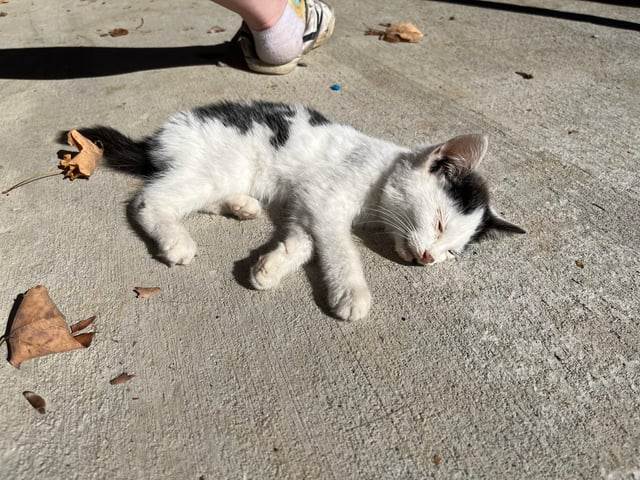
On a quiet street, a tiny kitten sat alone by the roadside. His eyes were closed, his fur matted and dirty, and he looked utterly pitiful. Despite the steady flow of people walking past, not a single soul stopped to help the helpless creature. I had never been particularly fond of cats and had never considered owning one, but the sight of this vulnerable little kitten stirred something deep within me.
I waited by the roadside for what felt like an eternity, hoping someone else would step in. But as the hours passed and the kitten remained untouched, a growing sense of urgency compelled me to act. I couldn't bear the thought of him dying alone, so I made the decision to help him.

Approaching the kitten was daunting; I had never raised a pet before and was apprehensive about handling him.
With a deep breath, I scooped him up and took him to a nearby hotel for temporary isolation. I tried to offer him some water, but he lay unmoving on the ground. My heart sank as I feared he might not survive.
Desperate to save him, I searched for the nearest veterinary hospital. The examination revealed severe infections in his eyes and nose. The vet's prognosis was grim: the kitten was in poor condition, and his survival was uncertain.
Medicines were prescribed, and I watched as he ate with surprising appetite, a small glimmer of hope.
I had planned to take a high-speed train to Nanjing that day, but with the kitten needing immediate care, I had to refund my ticket and opt for a ride-share. The journey was quiet; he slept soundly in the box. Upon arriving in Nanjing, he seemed more lively, eating a bit more and meowing softly.
The following morning, however, I discovered the kitten unresponsive and weak.
His breathing was shallow, and his condition appeared to have worsened overnight. I rushed him back to the hospital, where the vet informed me that his body temperature had plummeted below 35 degrees Celsius. The situation was critical, and even if he survived, the treatment would be costly.

Despite the daunting prognosis, I insisted on doing everything possible to save him.
The vet decided to start an infusion and prescribed additional medications. They assured me that if he didn't make it, the cost of the medications would be refunded. I was overwhelmed with emotion, struggling to keep it together as I worried for his life.
Throughout the day, I stayed by his side, watching anxiously as he lay in the ward. He barely moved, and several times I feared he had stopped breathing.
But as the hours passed, he began to show signs of improvement. By the afternoon, he managed to get up and eat on his own. The vet was surprised by his resilience, and I felt a surge of relief.
That evening, I returned to the hotel for some rest, leaving him in the care of the hospital. He was able to open his eyes more and even sneezed a bit, but he still had a good appetite. His recovery seemed promising.
On the fifth day, however, he experienced a setback. He lost his appetite and developed diarrhea. I took him to another hospital, where the vet prescribed medicine but after two days, his condition didn't improve. Then he vomited, and I hurriedly took him to a 24-hour pet hospital.
Tests ruled out major diseases, but an injury on his left hind leg was discovered. His foot was swollen, and it turned out he had a large, festering wound that needed thorough cleaning.
Seeing him in pain was heart-wrenching, and I felt immense sorrow and frustration. If the earlier vet had noticed the injury, it might not have become so severe.
After the wound was treated, I brought him home, but he vomited again that night. We spent another sleepless night at the hospital, where he received anti-vomiting medication and another infusion. The next morning, he seemed slightly better but remained weak.
By the ninth day, I found white worms in his stool. Further tests confirmed parasitic gastroenteritis. The condition was serious, and the kitten, now weighing only 350 grams, needed a gentle deworming medicine. I meticulously cared for him, ensuring he had the right food, milk, and probiotics. Despite the challenges, he showed signs of recovery.
On the tenth day, I finally brought him home. His condition was stable; he ate and drank well and had good energy.
The new cage hadn't arrived yet, so he had to stay in a box for a few more days. His foot injury was healing, but he still couldn't walk long distances. The vet had warned that his left leg might be congenitally disabled, so I was prepared for a long recovery.
In the following days, Jiu Wan, as I named him, became more confident and playful. His health continued to improve, and he adapted well to his new environment.
He would come to me for attention, meowing softly and lying on my feet, seeking comfort.
As the days turned into weeks, Jiu Wan’s condition improved significantly. He grew stronger, gained weight, and his personality began to shine. His intelligence and obedience were remarkable, and he adjusted to his new home with ease.
Reflecting on the journey, I realized how deeply affected I was by this little life.
From a sick, helpless kitten to a vibrant, playful companion, Jiu Wan’s recovery was nothing short of miraculous. I was grateful that I had chosen to help him and that he had made it through such a challenging start to life.



















